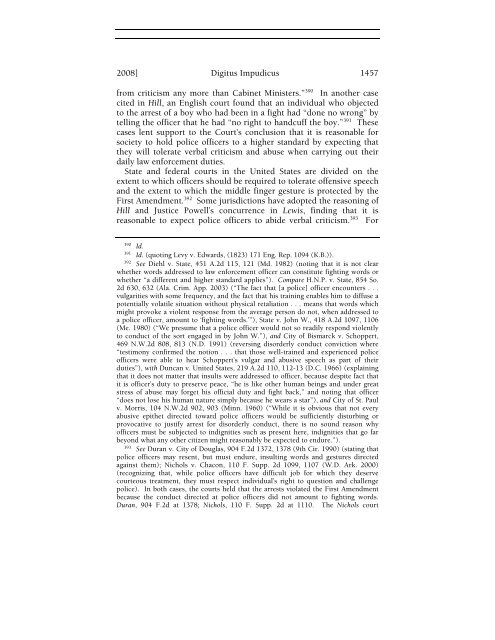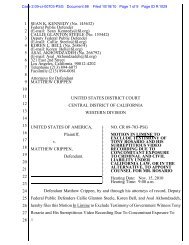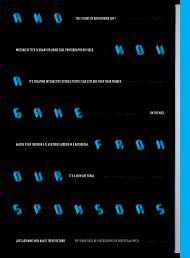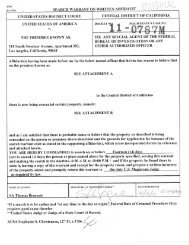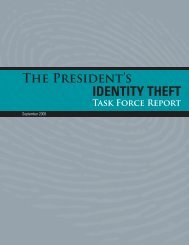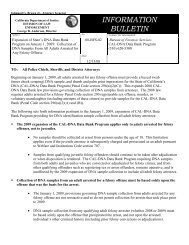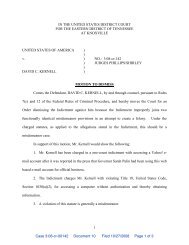Digitus Impudicus: The Middle Finger and the Law - Wired
Digitus Impudicus: The Middle Finger and the Law - Wired
Digitus Impudicus: The Middle Finger and the Law - Wired
Create successful ePaper yourself
Turn your PDF publications into a flip-book with our unique Google optimized e-Paper software.
2008] <strong>Digitus</strong> <strong>Impudicus</strong> 1457<br />
from criticism any more than Cabinet Ministers.” 390 In ano<strong>the</strong>r case<br />
cited in Hill, an English court found that an individual who objected<br />
to <strong>the</strong> arrest of a boy who had been in a fight had “done no wrong” by<br />
telling <strong>the</strong> officer that he had “no right to h<strong>and</strong>cuff <strong>the</strong> boy.” 391 <strong>The</strong>se<br />
cases lent support to <strong>the</strong> Court’s conclusion that it is reasonable for<br />
society to hold police officers to a higher st<strong>and</strong>ard by expecting that<br />
<strong>the</strong>y will tolerate verbal criticism <strong>and</strong> abuse when carrying out <strong>the</strong>ir<br />
daily law enforcement duties.<br />
State <strong>and</strong> federal courts in <strong>the</strong> United States are divided on <strong>the</strong><br />
extent to which officers should be required to tolerate offensive speech<br />
<strong>and</strong> <strong>the</strong> extent to which <strong>the</strong> middle finger gesture is protected by <strong>the</strong><br />
First Amendment. 392 Some jurisdictions have adopted <strong>the</strong> reasoning of<br />
Hill <strong>and</strong> Justice Powell’s concurrence in Lewis, finding that it is<br />
reasonable to expect police officers to abide verbal criticism. 393 For<br />
390 Id.<br />
391 Id. (quoting Levy v. Edwards, (1823) 171 Eng. Rep. 1094 (K.B.)).<br />
392 See Diehl v. State, 451 A.2d 115, 121 (Md. 1982) (noting that it is not clear<br />
whe<strong>the</strong>r words addressed to law enforcement officer can constitute fighting words or<br />
whe<strong>the</strong>r “a different <strong>and</strong> higher st<strong>and</strong>ard applies”). Compare H.N.P. v. State, 854 So.<br />
2d 630, 632 (Ala. Crim. App. 2003) (“<strong>The</strong> fact that [a police] officer encounters . . .<br />
vulgarities with some frequency, <strong>and</strong> <strong>the</strong> fact that his training enables him to diffuse a<br />
potentially volatile situation without physical retaliation . . . means that words which<br />
might provoke a violent response from <strong>the</strong> average person do not, when addressed to<br />
a police officer, amount to ‘fighting words.’”), State v. John W., 418 A.2d 1097, 1106<br />
(Me. 1980) (“We presume that a police officer would not so readily respond violently<br />
to conduct of <strong>the</strong> sort engaged in by John W.”), <strong>and</strong> City of Bismarck v. Schoppert,<br />
469 N.W.2d 808, 813 (N.D. 1991) (reversing disorderly conduct conviction where<br />
“testimony confirmed <strong>the</strong> notion . . . that those well-trained <strong>and</strong> experienced police<br />
officers were able to hear Schoppert’s vulgar <strong>and</strong> abusive speech as part of <strong>the</strong>ir<br />
duties”), with Duncan v. United States, 219 A.2d 110, 112-13 (D.C. 1966) (explaining<br />
that it does not matter that insults were addressed to officer, because despite fact that<br />
it is officer’s duty to preserve peace, “he is like o<strong>the</strong>r human beings <strong>and</strong> under great<br />
stress of abuse may forget his official duty <strong>and</strong> fight back,” <strong>and</strong> noting that officer<br />
“does not lose his human nature simply because he wears a star”), <strong>and</strong> City of St. Paul<br />
v. Morris, 104 N.W.2d 902, 903 (Minn. 1960) (“While it is obvious that not every<br />
abusive epi<strong>the</strong>t directed toward police officers would be sufficiently disturbing or<br />
provocative to justify arrest for disorderly conduct, <strong>the</strong>re is no sound reason why<br />
officers must be subjected to indignities such as present here, indignities that go far<br />
beyond what any o<strong>the</strong>r citizen might reasonably be expected to endure.”).<br />
393 See Duran v. City of Douglas, 904 F.2d 1372, 1378 (9th Cir. 1990) (stating that<br />
police officers may resent, but must endure, insulting words <strong>and</strong> gestures directed<br />
against <strong>the</strong>m); Nichols v. Chacon, 110 F. Supp. 2d 1099, 1107 (W.D. Ark. 2000)<br />
(recognizing that, while police officers have difficult job for which <strong>the</strong>y deserve<br />
courteous treatment, <strong>the</strong>y must respect individual’s right to question <strong>and</strong> challenge<br />
police). In both cases, <strong>the</strong> courts held that <strong>the</strong> arrests violated <strong>the</strong> First Amendment<br />
because <strong>the</strong> conduct directed at police officers did not amount to fighting words.<br />
Duran, 904 F.2d at 1378; Nichols, 110 F. Supp. 2d at 1110. <strong>The</strong> Nichols court


